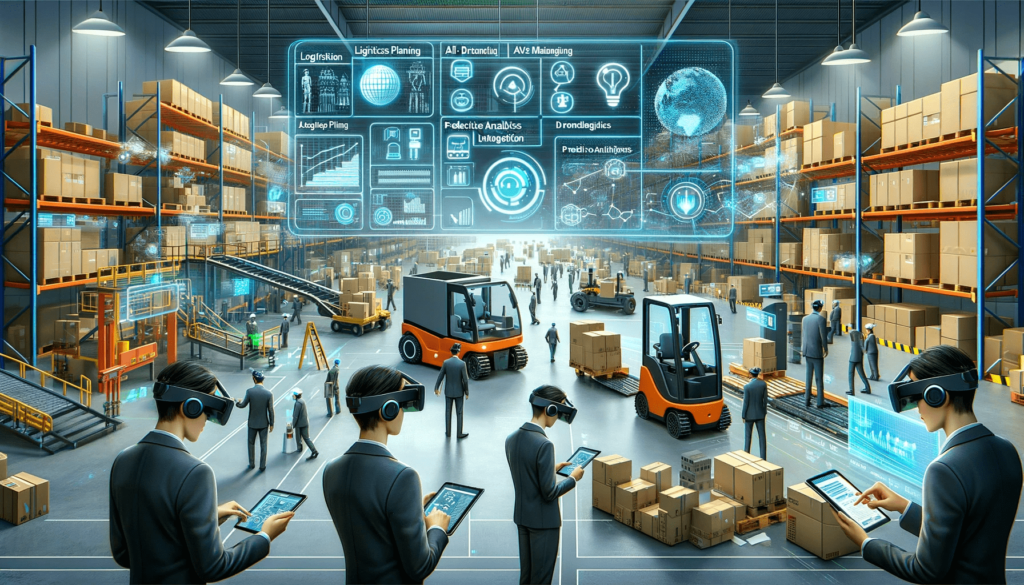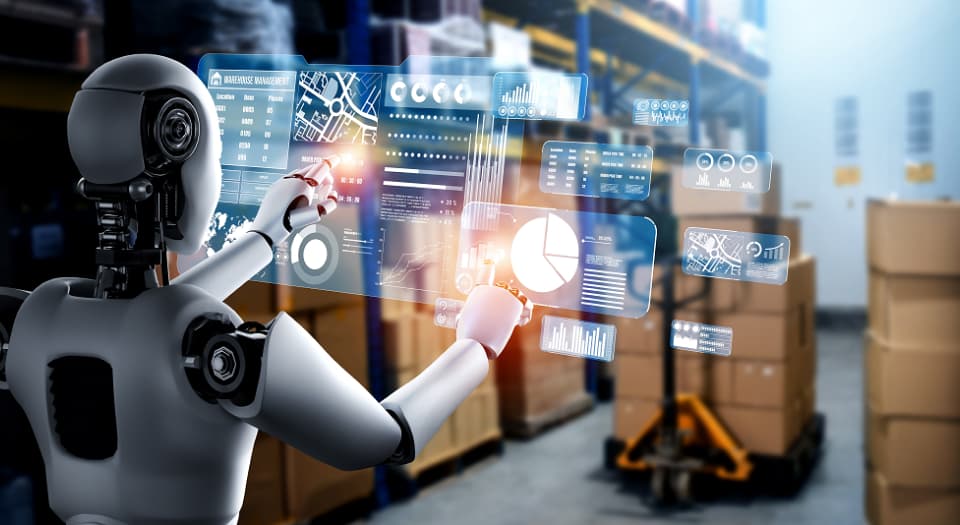
AI in Supply Chain Management: Revolutionizing Logistics and Operations
AI in Supply Chain Management: Revolutionizing Logistics and Operations
AI can work wonders within supply chain management to deliver significant business value. It can disrupt the traditional ways of doing business and catapult the companies into a geopolitical battle with China and other countries over AI prowess and IP. AI can bring about efficiency gains through better and more meaningful data, a better understanding of human behaviour, and sharper tools. Leveraging advanced programming techniques and shared memories has helped supply chain software developers create powerful algorithmic systems for shopping, booking flights, and GPS. As all these technologies advance, businesses must build on these AI tools and platforms to achieve operational efficiency and business growth. This article discusses how businesses can leverage AI in supply chain management, the role of an AI software development company, and the need to hire app developers with knowledge in AI and Machine Learning. By understanding these aspects, you can better harness Artificial Intelligence to deliver efficient supply chain performance.
The Impact of AI on Supply Chain Management
As strategic inputs for supply chain management, AI has revolutionised the traditional supply chain management processes by enabling tools and techniques for analysis and insights on the supply chain. AI-driven supply chain models are proficient in handling a large number of data sets, thereby sorting, managing and predicting demand patterns based on the human propensity, consumer preferences and the movements of goods or services. Below are some of the major ways AI is impacting supply chain management.
- More Effective Data Analysis: AI algorithms can analyse large sets of data with great accuracy, revealing ‘insights’ in patterns and correlations that some argue will direct strategic decisions. eg, setting sell prices and projecting demand using CRM data; analysing logistics patterns using IOT sensor data; AI study suggestthat these data patterns can drive inventory decisions of suppliers.
- Demand prediction: Thanks to historical, market and external/environmental factors, AI can calculate future demand, allowing businesses to better manage inventory levels. This would help limit stockouts as well as overstocking.
- Inventory Optimisation By an extensive analysis of sales data and supplier performance (along with lead times), commerce robots could optimise inventory levels for various items and guarantee that businesses maintain the right inventory levels at the right time without incurring excessive carrying costs.
- Logistics and Route Optimisation: AI can optimise logistics, for example by analysing data on transportation, traffic and delivery times, leading to better route planning, reducing transport costs and reducing delivery times.
Strategies for Leveraging AI in Supply Chain Management
They will find that strategic use of AI in the supply chain can enhance and invigorate the process in numerous ways. Here are some key strategic tactics to consider for using AI as a transformation weapon in the supply chain.
1. Embrace Data-Driven Decision Making
A data-driven strategy (collect and analyse data) underpins effective supply chain management powered by AI. The key is to extract information from diverse data sets (sales records, supplier performance, transportation data) and allow machine learning algorithms to turn this data into actionable insights that inform supply chain strategy and ultimately enhance performance.
2. Implement AI-Powered Demand Forecasting
AI-supported tools for forecasting the future demand will help companies better predict the demand more accurately and quickly. The integration of AI with the demand forecasting workflow will captivate the upcoming demand changes that will help shops manage their inventory according to demand requirements. the artificial intelligence would be gunning for the historical sales data and the market trends to forecast the future demand Thus, AI may analyse sales history and market patterns to help determine when specific products will be demanded in the future.
3. Utilize AI for Inventory Optimization
By analysing sales, supplier and lead time data, AI algorithms can decrease carrying costs and keep levels optimal. This results in the right products, at the right price, in the right quantities and at the right times. It also decreases cases of stockouts and overstocks.
4. Optimize Logistics Operations with AI
For instance, AI is able to optimise logistic operations by using the transportation data, traffic information and delivery schedule-related data, all for a certain object to analyse in order to provide the most efficient operation function, like intelligent route planning, maximise transportation capacity, and reduce the transportation cost. At the same time, this will also help the business to reduce and control the transportation costs, and reduce the delivery times and increase the customer satisfaction. For example, the intelligent logistic scheduling needs to analyse the real-time data of all the delivery routes planning.
5. Enhance Supplier Management with AI
AI can also help to quantify where a company stands with their suppliers. Based on past insights from performance, lead times and quality metrics, firms can proactively use AI-powered supplier management tools today to identify reliable suppliers, negotiate better terms, and continually improve their supplier relationships – ensuring they have a supply chain from which they can reliably deliver.
6. Partner with an AI Software Development Company
As a result, working with a third-party provider, an AI software development company, will give businesses access to the relevant expertise and infrastructure. An AI software development company can fit a system of AI technologies to a plausible supply chain process, even creating wholly new models of operations to strive towards. The software developer will optimise the functions of the AI system and fit it into the supply chain portion that contributes the greatest value.
The Role of an AI Software Development Company
When employing AI as a supply chain strategy for business transformation, it’s important to work with AI software development company to maximize the results of your digital strategy. Together with Biztek Solutions, you can develop innovative AI solutions to improve interactions with suppliers and optimize routing and tracking to streamline supply chain processes. For companies looking to implement AI into their operations, these are some of the benefits of working with an AI software development company:
- Faster, Specialised Solutions: An AI software development company can identify key existing problem areas or opportunities within your supply chain, developing bespoke solutions to tackle these issues – meaning that AI initiatives will be conducive with business goals.
- Scalability: Solutions from AI software development companies are scalable so that AI solutions grow with the business. This flexibility provides businesses with the flexibility when their needs change, which leads to the maximisation of long-term value of the AI investments.
- Expertise and Innovation: You have access to the best cutting-edge technologies and the most innovative and effective development and product improvement practices in the industry. You can’t beat the expertise of AI software development companies.
- Cost-Effectiveness: The process of coming up with AI solutions can be expensive and time-consuming, but by choosing to outsource your AI development to an AI software development company, you can significantly reduce costs and shorten development time, giving you a faster ROI.
Hiring App Developers Proficient in AI and Machine Learning
The comprehensive guidance to utilize the AI power in supply chain management is to hire app developer who are experts in AI and Machine Learning for building more competitive applications within the supply chain with additional AI features and ensure great user experience. Below are the benefits of hiring app developers with expertise in AI and Machine Learning:
- Better user experience: An AI-powered application can track user history and adapt to their behaviour and preferences, enhancing the usage experience and boosting user engagement and satisfaction.
- Innovative Functionalities: Apps with the capability of using AI and ML can be built by programmers adept in AI and ML. For example, features associated with demand forecasting, predictive analytics and route optimisations can be achieved. This can be used to make supply chain applications more versatile and competitive.
- Increased Efficiency: AI-enabled automation help businesses save costs by reducing manual intervention in processes and thus improving efficiency. For instance, AI-powered chatbots can help to answer routine customer questions on order status, such as ‘Where is my order?’ allowing human agents to focus on responding to more complex inquiries.
- Data-mined observations: Since AI can sift through masses of data quickly, it can extract useful observations on past performances: How does customer traffic surge on Fridays versus Sundays? Which customer complaints were brought to our attention? This opens up new opportunities for app developers to offer AI-driven insights to businesses.
Case Studies: AI-Driven Supply Chain Innovations

Case Study 1: Retailer Optimizes Inventory Management with AI
A major retailer enlisted the services of an artificial intelligence (AI) software house to enhance its inventory control procedures. This AI–enabled solution monitored sales, supplier performance and lead times in order to optimise stock levels. The partnership between the retailer and the software company resulted in a 20 per cent drop in carrying costs, a 15 per cent rise in stock availability, and an improved experience for shoppers.
Case Study 2: Logistics Company Enhances Route Planning
An AI-powered route optimisation firm helped a logistics company to optimise its delivery operations. The AI system developed by the logistics company coded the transportation data, traffic information and delivery timelines, and proposed the most optimal routes and the number of delivery stops. As a result, fuel consumption was reduced by 25 per cent, and the number of deliveries on time improved by 30 per cent, bringing operational efficiency and customer satisfaction.
Case Study 3: Manufacturer Improves Demand Forecasting
One manufacturer utilised an AI-powered demand forecasting tool to improve its production planning. The tool leverages AI to analyse historical sales records and broader market trends to predict future demand for its products. With this prediction in place, the manufacturer is then able to proactively adjust its production schedules to avoid stockouts and excess production. In turn, this brings about a 15 per cent increase in improved production efficiency and a 10 per cent reduction in inventory costs.
Conclusion
The sector of supply chain management is going through a dramatically changing influence of Artificial Intelligence (AI). AI now helps manage data, improve demand fulfilment, improve logistics and boost supply chain design. By choosing the correct strategic vision on AI adoption, by reacting creatively with AI software development companies and by hiring app developers who have the necessary AI and Machine Learning skills. One can trends can enable a new paradigm in organisations, where superior supply chain performance hinges on strategic execution.
For business leaders, the key to staying ahead in the AI adventure is to keep up with the news and continually improve their AI practices for the long-term sustainability of their business. Embrace the future! Incorporate your AI transformation in supply chain management and operations operations for a truly intelligent supply chain.






Leave Your Comment